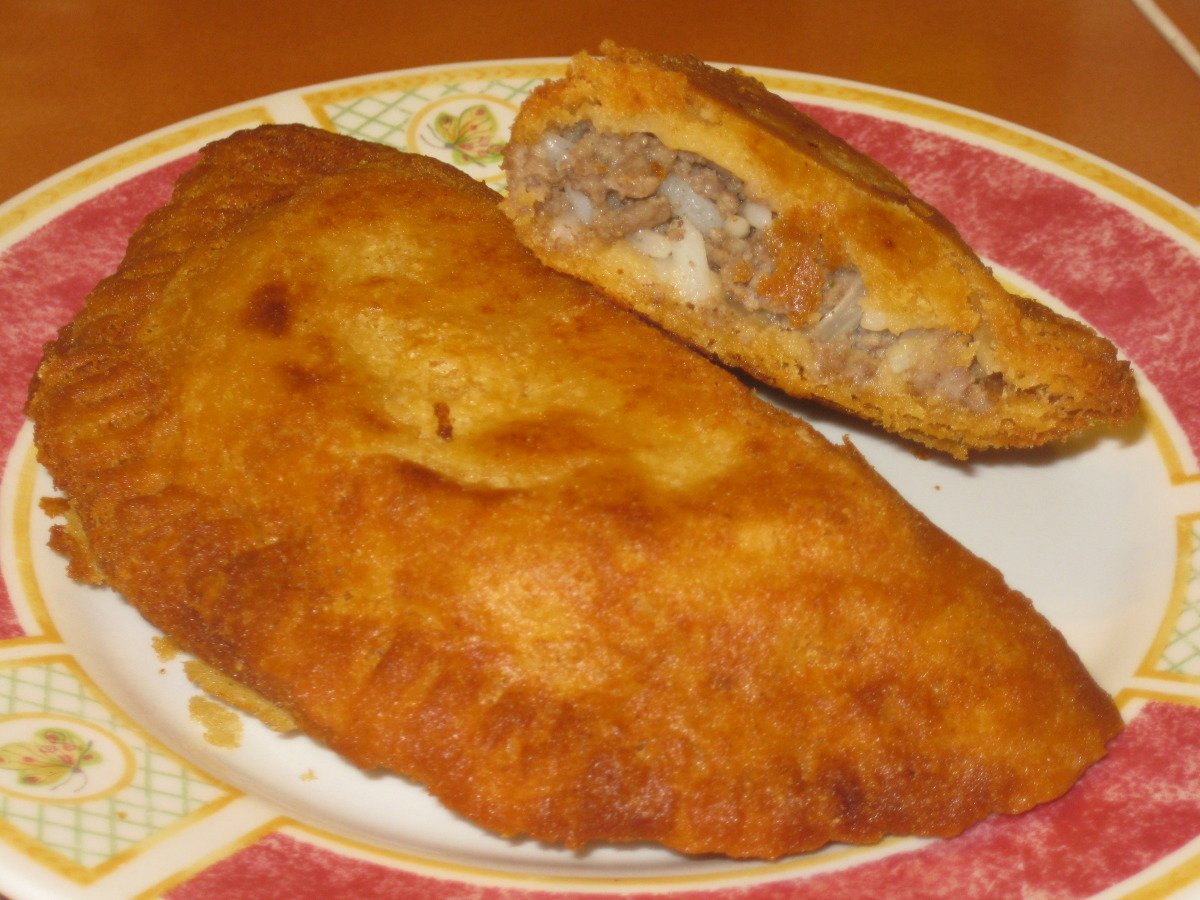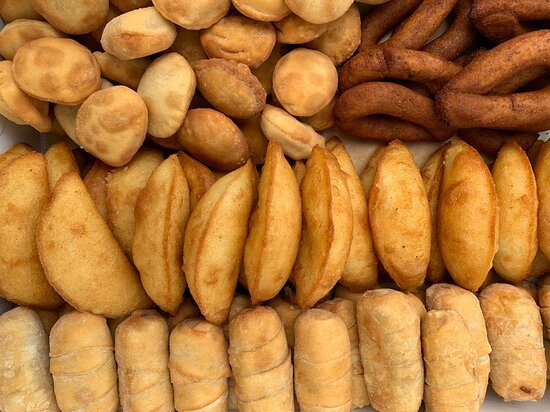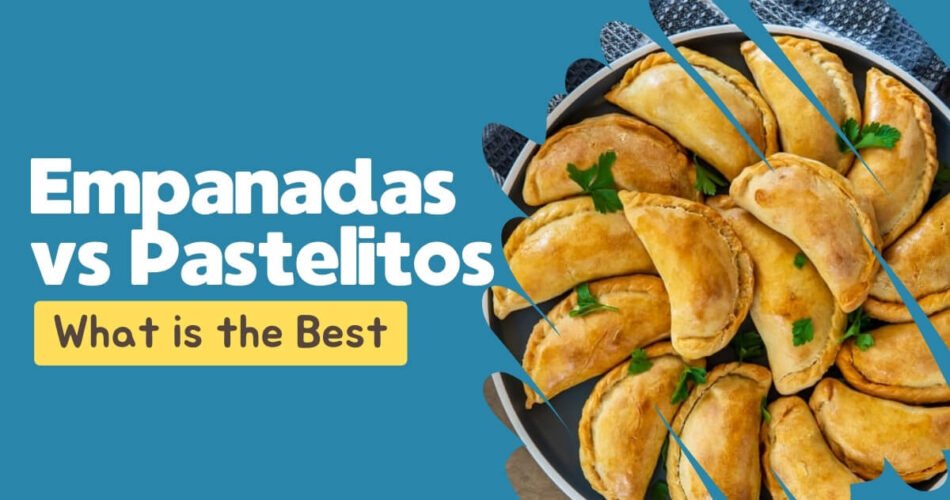Empanadas vs pastelitos: which reigns supreme? This has been a heated debate in my culinary encounters, especially when I’m relishing in the rich tapestry of Latin American cuisine.
What are empanadas?
When I think of empanadas, my mind wanders to the countless iterations I’ve savored from various corners of the world. These half-moon-shaped delights are stuffed pastries – crimped at the edge to hold an array of fillings, typically minced meat, cheese, or vegetables. With origins tracing back to Spain and Portugal, empanadas have embraced multicultural influences and have become a staple in Latin American countries. The main ingredients of the outer dough typically include flour, butter, and water, creating a tender and flaky casing for the rich fillings.
What are pastelitos?
Pastelitos share a deep place in my heart as well. These pastries, often found in Latin American bakeries and Cuban counters, bear a resemblance to empanadas but are distinguished by their lighter, puff pastry-like dough. They are frequently adorned with a sweet or savory filling – think guava and cheese for something sweet or seasoned ground beef for a savory bite. Historically tied to the culinary traditions of the Caribbean, pastelitos’ flaky, layered dough glistens under a sugary glaze which, for me, is a telltale sign of a well-crafted batch.
Empanadas vs pastelitos: What’s the Difference?
Let’s dissect the characteristics that set empanadas apart from pastelitos…
Ingredients
The ingredients are a clear starting point for comparison. Here’s how they stack up:
- Empanada dough: typically includes flour, fat (lard or butter), and water
- Pastelito dough: closer to puff pastry, involving a laminated dough with butter layers
- Fillings for empanadas: can range from meat, cheese, and vegetables to combinations thereof
- Fillings for pastelitos: often include sweet fillings like guava or savory ones like ham and cheese
Taste
The taste profiles are as diverse as the regions they come from. Empanadas often carry a heartier, more robust flavor, complemented by the buttery dough. On the other hand, pastelitos can offer a delicate, almost refined palate experience with their light and airy dough and sweet fillings creating a lovely taste contrast.
Price
Price can be a point of contention, but in my experience, empanadas and pastelitos often have comparable pricing. Of course, the cost can vary depending on the complexity of the fillings and where I’m purchasing them – a street vendor versus a gourmet bakery, for instance.
Appearance & Color
Aesthetically, empanadas have a golden-brown hue thanks to a baked or fried dough exterior, with a discernible crimped edge. Pastelitos may glisten more due to the sugary glaze, and their flaky layers are more noticeable, often lighter in color unless they have a caramelized sugar finish.
Nutritional Value
Comparing the nutritional value requires consideration of fillings and preparation methods:
- Empanadas can be either baked or fried, resulting in a range of caloric content
- Pastelitos, with their laminated dough, may have higher fat content but are typically baked, not fried
Calorie Counts
Calories are a tricky conversation as empanadas and pastelitos can be surprisingly similar or vastly different depending on size and filling:
- Empanadas: Average between 200-300 calories per serving
- Pastelitos: Typically in the 250-350 calorie range per serving
Regional Origins
Empanadas claim fame across Latin America, with special nods to Argentina and Chile, while pastelitos feel more at home in the Caribbean, especially in Cuban cuisine, where they’re a go-to snack or dessert.

Empanadas vs pastelitos: What are the similarities?
Despite their differences, the similarities are hard to overlook:
- Both boast a flaky, tender exterior enveloping a variety of fillings.
- Each can be served as a snack, appetizer, or dessert, depending on the filling.
- Originating from the Iberian Peninsula, they have honed their identity in Latin American cuisines.
Empanadas vs pastelitos: What is the best?
When it comes to distinguishing which is best, taste, flavor, and the pleasure provided tip the scale. In my book, while I adore the delicate sweetness of pastelitos, empanadas often emerge as the culinary heavyweight. Their versatility and heartiness make them a personal favorite.
Popular culinary uses of empanadas and pastelitos
The popular culinary uses of empanadas reflect their versatility:
- Appetizer trays at events
- Main dishes with heartier fillings and accompaniments
- Lunch boxes for a filling midday meal
For pastelitos, the uses often align with their sweet or lighter fillings:
- Paired with coffee for breakfast or a mid-morning treat
- As dessert at parties and celebrations
- Included in dessert platters at buffets and catered events

Where to buy empanadas and pastelitos
My quest for empanadas often leads me to Latin American markets, street food vendors, and specialty restaurants that honor authentic recipes.
In search of pastelitos, I am drawn to Cuban bakeries and Caribbean food shops where these delights are baked fresh daily.
How to store empanadas and pastelitos
To keep empanadas at their best, I usually refrigerate them in an airtight container and then reheat in a toaster oven to maintain crispness.
Pastelitos, particularly the sweet varieties, fare well at room temperature for a day, but for longer storage, I recommend chilling them and then warming them briefly before indulging.

Recipe: Easy Beef Empanadas & Guava Pastelitos
For an easy recipe, my go-to is a simple beef empanada matched with a guava pastelito – a truly harmonious coupling. The ingredients and steps are quite accessible:
- For the empanadas: ground beef, onions, garlic, cumin, pre-made empanada dough.
- For the pastelitos: guava paste, cream cheese, and pre-made puff pastry sheets.
Final Words
In the spirited debate of ’empanadas vs pastelitos,’ my vote tends to lean towards empanadas for their fulfilling nature and mouth-watering versatility, while recognizing the unique charm of pastelitos. However, it’s clear that both carry the banner of Latin American culinary excellence high – and quite deliciously so.

